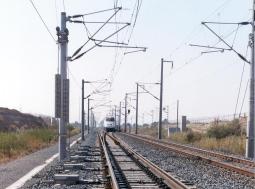FCC wins the contract for a new section of high-speed railway
The contract is worth 129 million euro

The Spanish Ministry of Development has picked a joint venture featuring FCC to build the Mediterranean Corridor connection for the high-speed Madrid/Barcelona/French Border line. The contract award is worth a total of 129 million euro.
The section is 61.9 kilometres long and has double tracks rated to enable trains to travel at 220 kilometres per hour. The construction period is 22 months.
The project includes the extension of the subballast layer, the improvement of the existing bed and the enlargement of the bed at L'Hospitalet de L'Infant Station.
Work will also be done on the infrastructure of the bed of the Iberian-gauge connecting spur from the gauge-changing installations at Central Station to the Reus/Tarragona line to afford access to Tarragona. This section of railway bed is a total of 2,266 metres long.
In addition, the beds will be enlarged at the mouths of Los Rojales Tunnel, six raised crossings and two dual gauge-changing installations and one provisional installation will be built, noise-reduction screens will be installed and the tracks will be fenced in.
During works execution, it is anticipated that upward of 300,000 cubic metres of subballast, more than 400,000 cubic metres of ballast, close to 200,000 sleepers and 229,000 metres of rail will be used.
A great deal of experience with high-speed railways
FCC has many years' experience in building high-speed railway infrastructure, beginning in the mid-eighties with the construction of four sections of the Madrid/Seville line, Puerta de Atocha Station in Madrid and Santa Justa Station in Seville.
After that FCC built ten sections of the Madrid/Barcelona line (a total of more than 90 kilometres) and Zaragoza-Delicias Station. It also constructed several sections of other lines now in service (Córdoba/Málaga, Madrid/Valladolid and Zaragoza/Huesca) and some of the most important sections of the Spanish high-speed system, such as Guadarrama Tunnel and Pajares Tunnel.
At present FCC is responsible for a large share (more than 180 kilometres) of the construction of Spain's new high-speed railway lines. At the same time, it is involved in building 100 kilometres of conventional railway line and more than 120 kilometres of metropolitan railway.al support and many other services.








